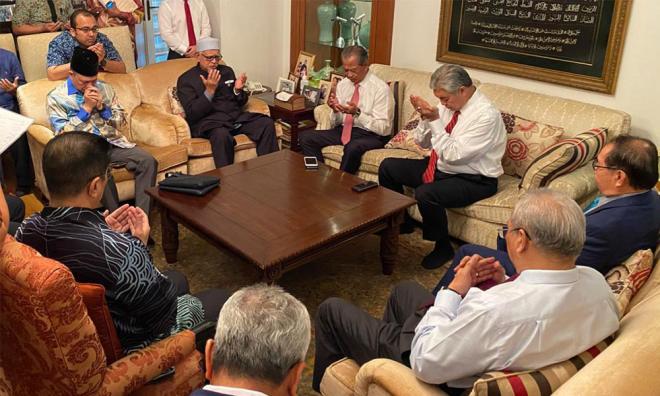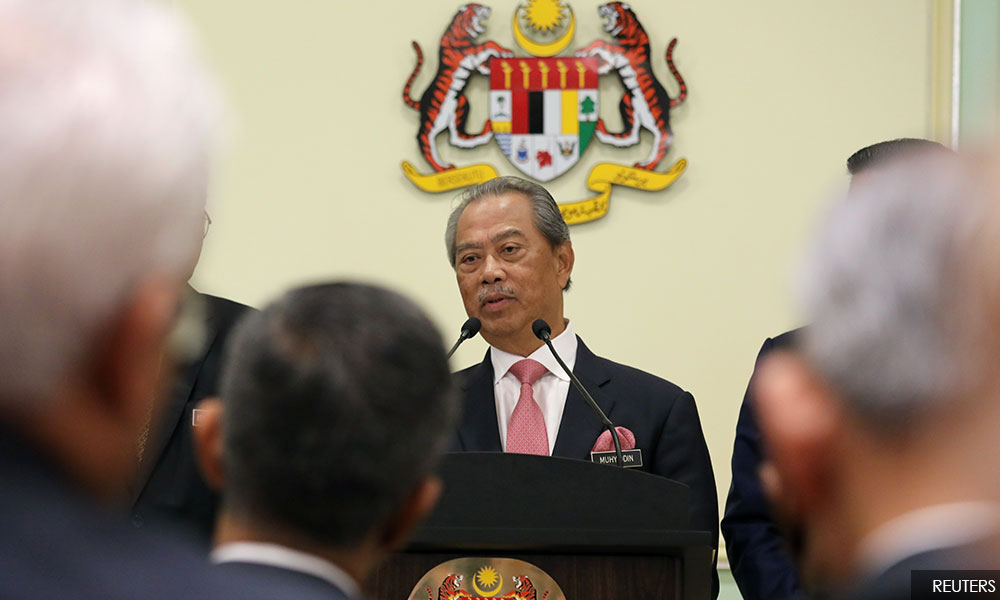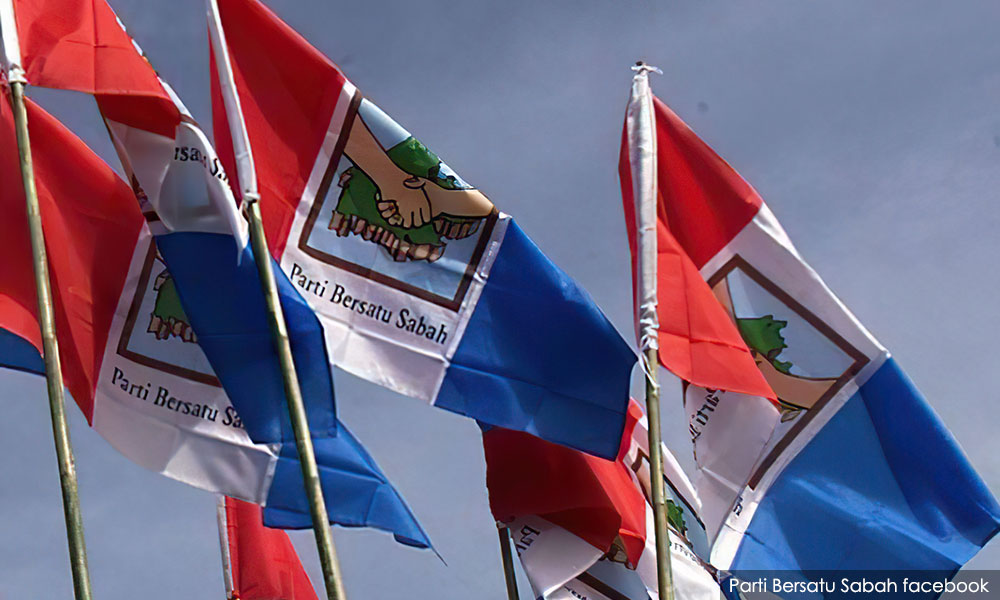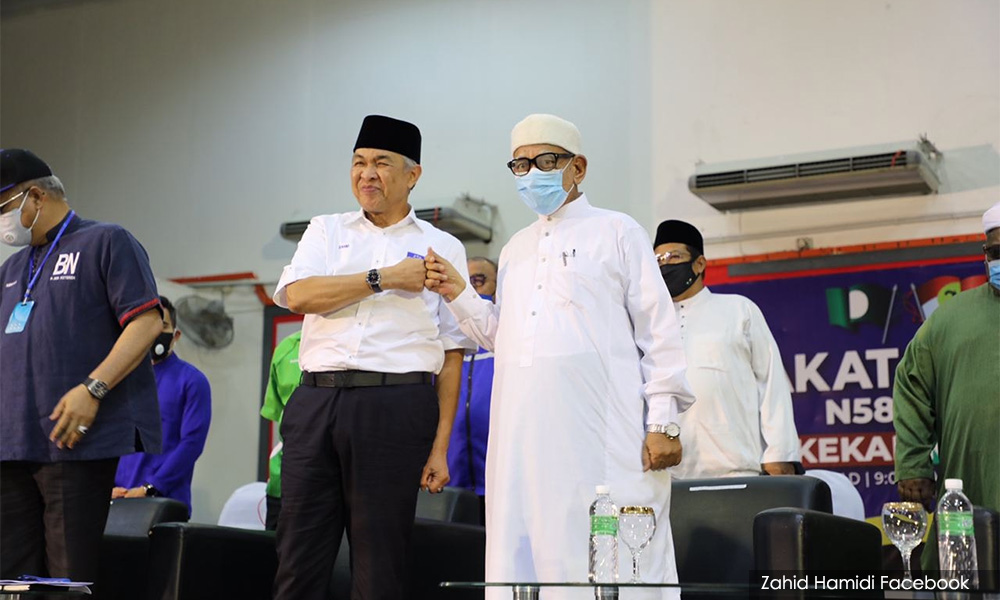
Six months after the Perikatan Nasional (PN) government came together to take over the federal government, the divisions in the governing coalitions of convenience are openly apparent. Not a day goes by without one of the different component parties taking a jab at others, be it with calls for the resignation of fellow ministers to contradictory announcements on electoral partnerships.
Malaysians are familiar with this pattern. Public assurances by leaders only confirm that there are escalating problems within and among the varied (and confusing) coalitions of governing parties - Perikatan Nasional (PN), Muafakat Nasional (MN) and Barisan Nasional (BN).
Not all is well in the coalition partnerships of the parties governing Malaysia at the federal level, what I call the Putrajaya coalitions.
Three’s a crowd
The PN 12-party government has not been able to translate these bonds into a viable electoral arrangement. Only four parties have formally announced they are part of PN (Bersatu, MIC, STAR and PAS) and debate surrounds seats, logo use, leadership and the position of different parties.
While smaller parties may still join PN, the failure of Muhyiddin Yassin’s coalition to evolve into an inclusive cooperative arrangement speaks to weakness. Despite holding the powerful position of the prime ministership, Muhyiddin lacks political gravitas to convince other parties to allow his arrangement to lead. The majority of PN government parties are happy being part of the Muhyiddin government but prefer their own independence and allies in an electoral arrangement.
The only Malay party electoral pact, Muafakat Nasional, is also under pressure. MN faces internal revolts as leaders are forcing the grassroots to accept Bersatu’s membership, moving the partnership from two to three. Resentments are especially serious in states where tensions between Bersatu and the other component parties are high, e.g. Kedah and Johor.

Muhyiddin’s announced call that his party would enter MN showcased the recognition that his own PN coalition is not viable and reflected a bow to Umno pressure to follow their lead. Importantly, it also signalled that Bersatu is not strong enough on its own to win seats (even its own), and is willing to return to the Umno fold to secure seats. This has not gone down well in parts of Bersatu too, with many members leaving to join Mahathir’s party, Pejuang.
MN is a difficult arrangement at the grassroots levels as traditional opposition and competition, often highly personalised, are being asked to be put aside in the name of Malay ‘unity’.
At the same time, there are attempts to reactivate and strengthen Barisan Nasional, which has more name recognition among voters and is seen as a known coalition umbrella. This familiar arrangement suits many of the ethnic and regional parties traditionally part of the BN government, as well as Umno, as it provided cover for the negative perceptions against Umno and puts them in a leadership role.
It also allows for BN-direct candidates to be fielded. Parties however are finding it difficult to return to the past, given pressures to change to a new arrangement and the legacy that BN failed as a coalition. Notably, Muhyiddin’s Bersatu is unwilling to go back to BN. As such, the BN is largely for electoral recognition and signalling alliances, an electoral label as opposed to meaningful partnerships.
Some parties such as PAS have joined more than one coalition, while others such as MCA are more cautious are opting for less risk. As the coalition names are used interchangeably and are changing, there is considerable confusion among the electorate about who is who and who is where.
All of the arrangements are political vehicles about accessing power in Putrajaya and with it the resources that come with holding power. They also represent two important features: foremost, they are about protecting those who have been in power in the past, especially Umno. At the core, they are comprised of conservative parties that oppose democratic reforms.
Second, they are about protecting the dominant position of the Malay political elites. Two substantive issues divide the Putrajaya coalitions - religion/secular governance and the rights of Borneo states, Sabah and Sarawak. These latter issues have been downplayed and have largely been put aside as the coalitions evolve, but ultimately, they are divisive.

The final and perhaps most serious division in the coalitions is personal differences, which corrode the trust relationships. The most significant of these is between two leaders - Muhyiddin and Najib Abdul Razak - both of whom would like to assure that the other not lead Malaysia and control the Putrajaya coalitions.
Key catalysts to shaky ties
Over the last month, three important catalysts have shaken the Putrajaya coalitions - the guilty verdict of Najib, the failed takeover of Sabah leading to state elections, and the pressured (and unwelcome by many) return of Bersatu (now as a nominal multi-ethnic party) into the Umno-dominant MN electoral alliance. These events have forced the different parties to face head-on underlying tensions within the coalitions and the stark reality that they will have to face the electorate - an electorate that remains polarised and less certain than in the past.
The public reckoning is making these Putrajaya coalitions to come to terms with three underlying issues, common in coalition governments elsewhere.
The first is the reality of competition among themselves for electoral support. MN is going after the same group of Malay voters in Peninsular Malaysia, who - even with the electoral packing of Malay seats in the past - do not comprise the number of seats to govern nationally.
The Putrajaya parties have also had to face the fact that the Malay community is not united. It has never been so and never will be, despite rhetoric to the contrary. Today, Malays are competing among themselves for political position in unprecedented levels of competition, and this trend will continue as the existing Malay parties across the political divide are too weak and fragmented to accommodate the expectations of the diverse and demanding electorate.
Malays also do not vote simplistically along ethnic lines, despite the dominant narrative by analysts to the contrary. Class, gender, regionalism and sub-identities within the Malay community matter. Malays, like other Malaysians, have different visions and aspirations for governance, with many engaging democratic and progressive ideals in spite of the dominance of conservative outlooks. These differences contribute to the competition.

Competition extends to the smaller parties within the Putrajaya coalitions as well. STAR and PBS - are competing among themselves for the same groups of Kadazan Dusun Murut (KDM) voters in Sabah, for example. It is no wonder Bersatu is nominally multi-ethnic as it knows that it needs to reach beyond the Malay base to win votes, especially in the Borneo states.
Underlying competition are different notions of membership within the coalition. Some - notably Umno - feels it should be dominant. Others disagree, pushing for greater equality. This different conception of partnership fuels tensions as Umno continues to act as if it should be entitled to leadership.
Smaller parties, especially those from Borneo, are fed up with second-class membership and pushing for greater power. The level of representation is complicated by the fact that smaller parties have ‘kingmaker’ powers and expect more despite their size. The positioning of the different coalition partners is evolving and destabilising the Putrajaya coalitions. There is more demand for equality within the coalitions.
The third dynamic taking place is delegitimation. Pakatan Harapan had a honeymoon of a year. PN has gained six months of support with half of the electorate, traditional BN supporters and those happy with measures associated with Covid-19 relief. The honeymoon PN received, however, is fading fast, with the moratorium end on the horizon, discontent with inadequate distribution of goodies to those expecting more, and deepening on the part of Harapan supporters against PN; greater opposition against Muhyiddin is gaining momentum.
This delegitimation is happening in the public at large and within the Putrajaya coalitions, over the Najib conviction and poor performance of PAS ministers at the national level, for example. While Muhyiddin has public support outside of Klang Valley, he is not seen as a strong leader managing a stable government, and the support levels have dropped from the height of the Covid-19 period.
Supporters are unhappy
Muhyiddin is not the only leader being questioned within the Putrajaya coalitions. Open infighting inside Umno over Najib’s leadership continues, and there is growing disgruntlement against Abdul Hadi Awang’s PAS chosen leaders.

Deals by the political elites about the coalition’s partnerships - and related issues such as seats and resources - are being questioned. Supporters are unhappy with the political compromises being made to stay together and in power. Gaps between the Putrajaya party elites and their grassroots are widening as it is not clear how the party faithful are being accommodated.
Issues such as RU355 and syariah law being put on the back burner, and failure to remove a PAS minister for violating quarantine, for example, have raised questions about national and party leadership. Grouses against each other are gaining traction on governance issues. Deals are increasingly not seen to benefit those on the ground, especially as reports of personal use of office and jealousies over distribution percolate.
The end effect is that the longer the Putrajaya parties stay together and in office in the various rubrics, the more delegitimation potentially undercuts their relationship with their political base within their own parties and in the public.
Competition, different notions of equality in partnership and delegitimation are part and parcel of coalition governments, along with instability. The new Putrajaya arrangements in all their varied forms will not resolve these underlying features, at least under the current leadership. Attention is turning to the results in Slim and Sabah for clarity buy that will not likely come. The tensions in Putrajaya are likely to escalate.
BRIDGET WELSH is a Senior Research Associate at the Hu Fu Centre for East Asia Democratic Studies and a Senior Associate Fellow of The Habibie Centre. She currently is an Honorary Research Associate of the University of Nottingham, Malaysia's Asia Research Institute (Unari) based in Kuala Lumpur. She tweets at @dririshsea.
The views expressed here are those of the author/contributor and do not necessarily represent the views of Malaysiakini.



No comments:
Post a Comment
Note: Only a member of this blog may post a comment.